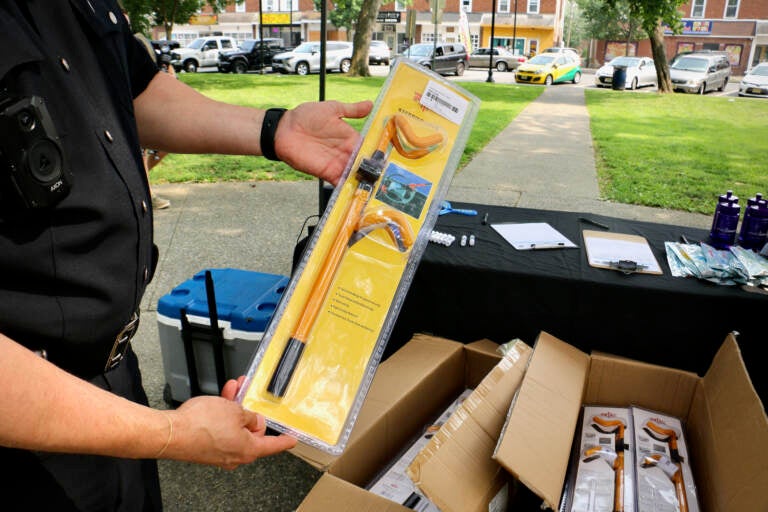Unattended running cars are driving up car thefts in 3 South Jersey cities
The three South Jersey towns saw auto thefts trending upward even before the pandemic began.

Camden County police officers hand out free steering locks to residents who drive vulnerable Hyundai and Kia cars at Yorkship Square Park in Camden. (Emma Lee/WHYY)
Three South Jersey towns experienced an acceleration in car thefts before the pandemic hit and prior to a statewide car theft spike in 2021.
And COVID did not slow that down.
Gov. Phil Murphy recently signed new laws to put the trend in reverse.
Data culled by WHYY News from New Jersey State Police and local police departments show that reported car thefts in Atlantic City, Cherry Hill, and Pennsauken rose consistently between 2018 and 2022.
In Atlantic City car thefts climbed on an average of 40% over the five-year period. In Cherry Hill, it increased 38% and nearby Pennsauken saw a 30% bump during the comparable period.
The increases are significant, according to Christopher Hermann, Associate Professor at John Jay College of Criminal Justice and a former crime analyst supervisor with the New York Police Department.
“Obviously, the numbers have gone up quite a bit since 2018,” he said. “The question is going to be when is that trend going to start to level off or hopefully start to reverse itself.”
Herman adds that the pandemic has been blamed for increases in crime in 2021 and 2022. However, car thefts emerged as a problem much before then, he said.
“The fact that this is a five-year problem kind of shows how big of a problem it is,” he said.
Car theft was becoming an ‘epidemic’ in New Jersey
Across New Jersey, auto thefts spiked by more than 22% in 2021 and 7% in 2022.
Concerned by the data, New Jersey Attorney General Matt Platkin and State Police Superintendent Col. Pat Callahan raised the issue in March 2022.
State Sen. Declan O’Scanlon was keeping a close watch on the problem prior to Platkin and Callahan’s public notice. Then in early 2022, someone attempted to steal his car from his driveway while he was on a podcast interview with constituents.
A neighbor called the cops after they saw the suspect jump out of a vehicle and walk onto O’Scanlon’s driveway.
“All of a sudden, there were five or six police cars out in front of my house,” he said. “They showed up in time to scare the guy off.”
O’Scanlon (R-Monmouth) said the suspects got away and were never apprehended. The incident added fuel to the case he was making to crack down on car thieves.
“This epidemic is right on our doorsteps and it’s dangerous,” he added. “It was 8:00 in the evening. My dog could have been outside. My wife could have been outside. I could have been outside.”
Dr. Alejandro Giminez Santana, an assistant professor and the director of the Newark Public Safety Collaborative at Rutgers University-Newark, called raising awareness an important first step.
“I don’t think it’s enough just to say we have a problem with auto theft,” he said, adding that there needs to be a discussion about why auto theft is a problem and what is driving the numbers up.
“[Trying] to connect the problem with some of the narratives that explain why this problem is happening is important,” Giminez Santana added.
How do cars get stolen?
One of the common narratives and themes emerging from car theft incidents is unattended running vehicles, officials said.
“Our victims would commonly just leave their vehicles running in the parking lot unlocked and they would go run in a Wawa,” said Pennsauken Police Chief Phil Olivo.
Cherry Hill Police Chief Robert Kempf adds cops are seeing more people leave their key fobs in their cars, too, making them vulnerable.
“You get out of the car, you go inside to your house and the key fob stays behind,” he said. “I think it’s easier to leave a key fob in your car just as a practical matter than it is maybe to leave your keys that have your house keys on it.”
Thieves are also targeting high-end cars such as the Dodge Challenger SRT Hellcat, Range Rovers, and BMWs more frequently.
What are cops doing to stop cars from being stolen?
Police departments in the three cities are actively working to reduce car thefts.
Kempf said his department had to develop a “laser-focused response” describing it as “a multi-pronged approach, sort of a combination between high visibility patrols, investigative tactics.”
His department assigned an officer to the New Jersey State Police Auto Theft Task Force and is using data to find patterns and develop strategies.
Olivo has increased patrols and issued public service announcements reminding people to not leave their cars running unattended. His department has worked with housing complexes where auto thefts have been an issue.
“They’ve been great partners,” he said. “We’ve asked them to install cameras, surveillance cameras, tag readers.”
Olivo, like other officials, has expressed concerns about bail reform contributing to the problem.
“It seems like there’s been a lack of accountability,” Olivo said. “[Suspects are] usually released sometimes before we’ve done the paperwork. If not, they go down to jail and are usually released in a day or two.”
Atlantic City Police are also educating residents.
“Community members are encouraged to be on alert, look out for each other, and report suspicious activity by either calling 9-1-1 or through our anonymous texting service, tip411,” said spokesman Lt. Kevin Fair, in a written statement.
In addition to keeping more detailed information about theft locations and offenders, Fair added the department added automated license plate readers at all entrance and exit points in the city. Officers can monitor the readers from their patrol cars.
“If a stolen vehicle enters or exits Atlantic City, we have real-time information that can be used to interdict the vehicle and arrest offenders,” he said.
Rising car thefts cause higher car insurance premiums
Though it is not a big part of how insurance premiums are calculated, car thefts are a factor nevertheless.
“Where you live in terms of your premium is about a third [of it,]” said Jill Gonzalez, an analyst at WalletHub. “The rest really comes down to personal history and what kind of vehicle you’re insuring.”
Within the “where you live” part of the premium, the number of car thefts in an area is taken into consideration. An analysis by the personal finance website found that as auto thefts have increased, so have insurance rates
The average annual car insurance premium in New Jersey is $1,754 for full coverage and $782 for minimum coverage.
In South Jersey, drivers in Burlington, Camden, Cape May, and Salem counties are paying $1,770 on average for annual full coverage.
Atlantic County drivers pay the least, $1,621, while Mercer County drivers pay the most at $1,811. Full coverage premiums in Gloucester County cost $1,754.
“In the South, particularly, the closer you are to Philadelphia…that’s where we see higher premiums,” said Gonzalez, adding that it’s a similar situation for North Jersey and its proximity to New York City.
Despite state officials responding to the rise in car thefts, she adds premiums will not go down until car thefts do down.
“If those laws are well enforced and they cause less car thefts to occur, then that overall in the scope of where you live and how that’s factored into your premium could be helpful,” Gonzalez said. “But just a law being passed, not really going to do much for you in terms of your premium.”
New laws take on car thefts
Gov. Murphy signed a package of new laws earlier this month that cracks down on car thefts by keeping suspects in jail if they were recently convicted or arrested for car theft, criminalizes the use of a master key fob or computer program to steal a car, and stiffens penalties for those who are either leading or participating in an auto theft ring.
O’Scanlon, who has co-sponsored the legislation, called the newly signed laws a good first step. He said the next step should involve looking at stiffer penalties to deter auto thefts.
“You need a very good deterrent for first offenders, a very fair deterrent for first offenders,” he said. “But the escalation needs to be dramatic after that so that they know that under no circumstances do you escalate and put people’s lives in danger.”
While the tougher laws are welcomed by law enforcement, they say drivers can do their part as well.
“If your car’s locked and your keys aren’t in it, they’re not going to take your car,” said Olivo.
Professor Giminez Santana said everyone has a part to play.
“It is about changing behaviors [and] understanding the risks that are connected to these [problems,]” said Giminez Santana. “People can play a role in becoming co-producers of these efforts of reducing auto theft by simply changing the way they behave.”

Get daily updates from WHYY News!
WHYY is your source for fact-based, in-depth journalism and information. As a nonprofit organization, we rely on financial support from readers like you. Please give today.






